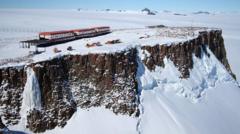In a startling development, a group of scientists stationed at the South African-run Sanae IV research facility in Antarctica has found itself grappling with serious allegations after a team member was accused of assault. The remote research station, situated approximately 170 kilometers from the ice shelf edge, usually accommodates around ten researchers at a time. A spokesperson for the South African government confirmed to the BBC that "there was an assault" following prior reports of inappropriate behavior within the base.
The South African Environment Ministry has stated that it is treating the situation with "utmost urgency." Reports from the South African Sunday Times, the first media outlet to cover the incident, suggested that team members have requested to be evacuated from the challenging environment they are meant to study. In response to these concerns, the ministry clarified that all team members undergo multiple evaluations, including background checks and psychological assessments.
Sanae IV, over 4,000 kilometers from mainland South Africa, presents formidable challenges associated with its harsh weather conditions, often isolating scientists for extended periods. While past expeditions have typically proceeded without serious incident since their inception in 1959, heightened tensions arose when one team member sent a message outlining "deeply disturbing behavior" exhibited by a colleague. Reports have surfaced indicating that the alleged assault stemmed from a dispute involving a task assigned by the team leader, which required a re-evaluation of their schedule.
Although incidents within Antarctic research stations are rare, they are not without precedent; a stabbing was reported at the Russian-operated Bellingshausen research station in 2018. Craig Jackson, a workplace health psychology expert at Birmingham City University, highlighted the psychological impacts of isolation, noting that in such constrained environments, small disagreements regarding hierarchy or workloads can escalate and potentially flounder into serious conflicts.
This incident at the Sanae IV station has underscored the precarious nature of collaborative scientific research in remote settings, prompting questions about mental health and team dynamics in extreme conditions.



















